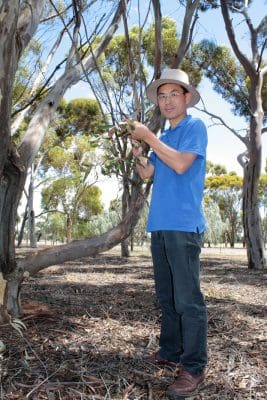NSW Department of Primary Industries (DPI) scientists have taken the cue from a naturally occurring phenomenon to explore the potential of Australian eucalyptus to control major weeds and crop diseases.

This naturally occurring phenomenon of bare soil and suppressed plant growth in the understorey has inspired NSW Department of Primary Industries (DPI) scientist, Dr Hanwen Wu, to investigate the potential of eucalyptus essential oil to control major weeds and crop diseases.
DPI principal research scientist, Hanwen Wu, said research had identified eucalyptus essential oils which had the potential to address agrochemical resistance in these pests – one of the biggest challenges farmers face this decade.
“The allelopathic effect of eucalyptus trees, where chemicals they release suppress plant growth in the understorey, is commonly seen in the landscape and we applied a scientific approach to investigate that observation,” Dr Wu said.
“Laboratory tests showed that some eucalyptus oils, from a selection of 40 species, were able to completely suppress fungal growth of three major diseases, wheat yellow leaf spot and crown rot and canola sclerotina stem rot.
“We screened 300 eucalyptus species on weeds, including annual ryegrass, barley grass, fleabane, silverleaf nightshade and wild radish, to find that even at low concentrations some eucalyptus oils were able to prevent germination and growth of weed seeds.”
Dr Wu said there was huge potential to explore the use of eucalyptus essential oil as a bioherbicide for weed management.
“With rapidly growing herbicide resistance and no new molecules developed in the last 25 years, which could offer new modes of action to control weeds, these naturally occurring oils could be a gift from nature,” he said.
“We now need to find out how these oils work to inhibit weeds and diseases so we can adopt the technology for use in agricultural production and to safeguard the environment.”
Further study of other eucalyptus species, followed by the identification of bioactive compounds, could provide chemical leads for the development of new herbicides with new modes of action.
An estimated 800 plus eucalyptus species in Australia offer a unique opportunity to manage weeds and crop diseases.
The research was funded by the NSW Government Weeds Action Program 2014-2015, with support from Meat & Livestock Australia and the Graham Centre for Agricultural Innovation – an alliance between DPI and Charles Sturt University.
Source: NSW DPI

HAVE YOUR SAY